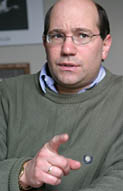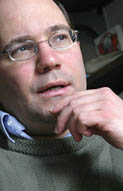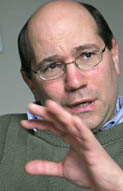In the News: Gil Troy
OFF AND RUNNING: The battle for the presidency
McGill professor Gil Troy is an expert on modern U.S. political history. He has written books and taught courses on American presidential election campaigns, so we asked him for some observations and predictions about the 2004 race for the keys to the White House.
 |
 |
 |
Do you agree with Senator John McCain that this will be the nastiest
campaign ever?
In my book on political campaigning, See How They Ran, I have
quotations going back to the 1830s or '40s, in which people say that the
upcoming campaign will be the nastiest ever. You have to go back to the 19th
century when they didn't have libel laws to worry about to see real
mud-slinging. Someone accused Andrew Jackson of murdering eight soldiers. The
1828 Jackson campaign was so ugly, in fact, with accusations that his wife
had married shortly before she divorced her first husband, that she had a
heart attack before the election and Jackson blamed his critics for killing
her.
It will be a little tamer than that, but still a very nasty campaign. Part of it has to do with the fact that the electorate is deeply divided, and we're also in an era of very intense partisanship.
John Kerry is portrayed by Republicans as a far left liberal. Is this
accurate?
The Republicans are trying to figure out what their line is going to be on
Kerry. On one hand, they're saying that he's extremely liberal and has voted
way down the liberal line; at the same time, they're trying to make him out
to be a waffler. That's a bit of a contradiction; you can't be both a waffler
and an ideologue, although someone from the Republicans told me they will
portray him as an ideologue who waffles in order to cover up how extreme a
radical he is. That's a way of squaring the circle.
Was the constant rerunning of Howard Dean's "scream" what did him
in?
That was a great dramatic moment reflecting something much deeper. The fact
that Dean collapsed so quickly shows that it was just a classic pre-election
boom. A lot of reporters had decided he was elected before a vote had been
cast. What we saw was a lot of energy on the Internet, a lot of five- and
ten-dollar donations, and a surge in public opinion polls. But when people
actually had an opportunity to vote for him, they didn't. The "scream" was
only part of it, but it was the beautiful dramatic device that every
historian and political analyst will use to tell the story of his collapse.
What was Dean's contribution to campaign politics?
I was never sure that he was revolutionizing campaigning, but he at least
sensitized the political establishment to the potential of the Internet. He
and Joe Trippy, his campaign guru, were trying to create a whole new paradigm
of Internet campaigning. I don't think that's going to happen for a while,
but we'll see more use of the Internet as an extension of regular
campaigning.
Has the Internet changed the campaign process?
My book on political campaigning argues that there's always been an
assumption that technological change runs campaigns, and that it's embraced
by Americans because they are so dynamic, innovative and desperate to win
their campaigns. But, either because of ideological resistance or simply
because of the power of political tradition, it takes a while to adapt to a
new format.
The Internet fosters a superficial kind of political activism - the New York Times calls it "slacktivism." You get something that's pro-Kerry, and you send it to ten of your friends, and they send it back to you and you go back and forth about how terrible Bush is. You're talking to people who are predisposed to liking Kerry in the first place, and you really haven't done much of anything except entertain yourself for ten minutes. That's not political change, and I think that's a lot of what's happening on the Internet so far.
Is Kerry a compromise candidate because Dean made people
nervous?
Kerry is this untested, mystery candidate. I can't think of a candidate who
emerged so quickly, almost from nowhere, despite the fact that he's been a
senator for 18 years. He's got a long public record, but Americans don't know
him. From the Democratic perspective, the danger is that he's untested in
battle. He's had too many easy victories, and it would be helpful for him and
the Democratic Party if he had gone a couple of rounds in which someone had
hit him a few times and the press had turned on him. Reporters build someone
up, then start knocking them down. It would be helpful to see how he survives
that knocking down process.
I don't see him so much as a compromise candidate, although this notion of Kerry being the "electable one" suggests that there was a kind of panic in the wake of the Howard Dean episode.
Will Ralph Nader's candidacy be damaging for the
Democrats?
There's no doubt that Ralph Nader was incredibly damaging to the Democrats
last time. In Florida and probably in New Hampshire he siphoned off
thousands, if not tens of thousands, of votes that could have gone to Gore.
In this election, we're talking about a highly polarized electorate, in which
key votes in key states are essential, so Nader is a double danger to the
Democrats. Besides the votes that he can siphon off, his presence in the race
will force Kerry to go left. If the Democrats want to win, they have to go
right, or centre. Elections are won in the centre.
How will George Bush sell himself in this campaign?
I think he will sell himself as the President who, in the wake of 9/11, got
up and said, "My presidency will be defined by how effectively I deal with
this threat, and by how comfortable Americans feel about how aggressively I
go after these evil people." Bush will want to appear as Mr. National
Security. He knows that if Americans are thinking about national security
they will vote Bush; if they are thinking about the economy, they will vote
Kerry.
How will Kerry and the Democrats sell themselves?
Kerry is dancing on the head of a pin in many ways. He's trying to say that
he was pro-war but anti the way the war is being handled; for an aggressive
approach against terrorism, but not the way the Republicans are being
aggressive. He's saying, "Look at me, I'm this great Vietnam vet - except I
opposed the war." There is nuance and complexity, which is nice. The
frustration with Bush is that he tends to be a little too simplistic. What
Kerry wants to do is reassure Americans that he's enough of a grown-up to
handle national security - in a way they never fully believed Clinton could -
while also saying, if it's the economy, stupid, he's the guy.
The war in Iraq strained U.S. relations with many countries. Is world
perception of U.S. foreign policy an issue the Democrats will
exploit?
The Democrats should be smart enough not to try to exploit it; it would only
make them look bad. When John Kerry talks about relying on the UN or about
multilateralism, he sets himself up for a quick sound bite rejoinder by Bush.
Bush can say: "I won't mortgage my policy to anybody, I won't let American
lives be determined by the UN." In America, the UN is a code word for a bunch
of nincompoops who made Libya the head of a human rights commission, who
don't understand the difference between Zionism and racism, and who don't
have any kind of principles.
Is there a part of the population angry enough about the war to
create a backlash?
The question is, who are the angry ones? The biggest danger for Bush is that
Iraq gets dramatically mismanaged so that there is a backlash among
rock-ribbed Republicans in the south and the west - the ones who send their
boys off to war. If it's a backlash among the same people who are pissed off
about the Florida election, about issues like Iraq, Kyoto and gay marriage,
it doesn't matter to him. They wouldn't vote for Bush anyway.
What issues will Bush avoid at all costs in the
campaign?
Osama bin Laden, as long as bin Laden is missing. Also, there were some major
intelligence failures that occurred on his watch. In Bob Woodward's book Bush
at War, Bush admitted that the first thing in his mind when he heard about
the 9/11 terrorist attacks was "I hope it wasn't those Arabs I heard about
who were taking flying lessons." When I read that, I got shivers. Bush also
doesn't want to talk about his past, stories about drinking and alleged
cocaine use.
What will Kerry avoid?
His voting record, since he voted more left wing than most Americans would
prefer. And I think he wants to avoid a debate on cultural and toughness
grounds; he wants to keep the focus on the economy, and keep Bush on the
defensive.
Are sitting presidents hamstrung in an election year? Should
campaigns be shorter?
Things are certainly politicized in an election year, and there is a certain
rhythm to a four-year term. As a historian, to me it is no coincidence that
the first 100 days of Franklin Roosevelt's, Lyndon Johnson's and Ronald
Reagan's presidencies were the most productive times for them. A new
president is coming in with a mandate and the first opportunity to exercise
their power. It was all front-loaded. It's also not a coincidence that the
great disasters of the last 50 years, from Watergate to Iran Contra to
Lewinskygate, all took place in the second term.
There will be complaints about the length of the campaign process, but you can't really shorten it, because of free speech.
What campaign reforms would you like to see?
I'm very skeptical about elaborate campaign finance reforms. My approach
would be to have full disclosure, which is very easy nowadays on Internet
sites. Also, some limits on huge gifts.
In general, I'd like to see serious educational changes among the electorate; a more serious orientation among the American people. I dream of the day when Election Day is as popular and significant as the Super Bowl. But at this point, the Super Bowl will out. As long as America continues to be a leisure culture that celebrates superficiality, one more concerned with Janet Jackson's breast than John Kerry's mind or George Bush's vision, we're in trouble.
Gil Troy was interviewed by Montreal writer Sylvain Comeau.


